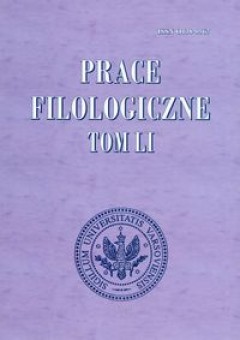Z dziejów wykształcania się abstrakcyjnych znaczeń wyrazów: rozwój semantyczny czasownika {zależeć}
Some Remarks on the Development of the Abstract Meanings in Polish: the Case of the Verb {zależeć} ‘to depend’
Author(s): Renata GrzegorczykowaSubject(s): Language and Literature Studies
Published by: Wydział Polonistyki Uniwersytetu Warszawskiego
Keywords: semantyka; znaczenie; czasownik {zależeć}; semantics; meaning; the verb {zależeć} (‘depend’)
Summary/Abstract: The verb {zależeć}, derivated from {leżeć} (‘to lie’), in the contemporary Polish chiefly denotes a very abstract relation belonging to the domain of causality. The phrase {A zależy od B} (‘A depends on B’) means that B is a condition for A, e.g. {Powodzenie działania zależy od aktywności działających} ‘The success of the action depends on the activity of the participants’, {Pomyślność lotu zależy od pogody} ‘The success of the flight depends on the weather’. In this sense the verb {zależeć} denotes a general, undetermined conditional relation between two potential states (events). It is contrary to typical causal relation, which binds two real events (e.g. {Zła pogoda spowodowała katastrofę} ‘The bad weather caused the catastrophe’). This abstract meaning of the verb {zależeć} finally constituted during the 20th century. The first use of the verb zalez˙ec´ in this meaning is related with the translation of the Latin word {dependo, dependere} (in jurist texts). There is also a psychological sense of the verb {zależeć}. In this sense one can say in Polish e.g. {Osobie X zależy na zdobyciu Y} (The person X is very keen on getting Y). This sense emerged also very late and finally constituted in the 20th century.
Journal: Prace Filologiczne
- Issue Year: 2006
- Issue No: 51
- Page Range: 171-178
- Page Count: 8
- Language: Polish

